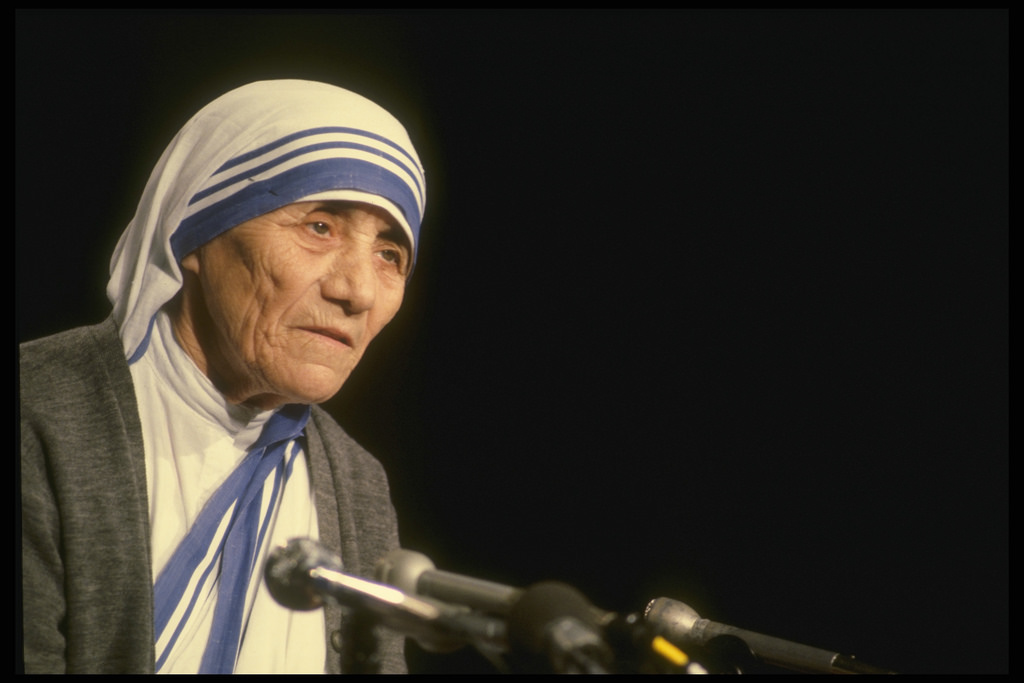In 1979, Mother Teresa of Kolkata was awarded the Nobel Peace Prize. According to the Nobel Prize Committee:
… the Peace Prize is to go to whoever “shall have done the most or the best work for fraternity between nations, for the abolition or reduction of standing armies and for the holding and promotion of peace congresses”. The prize includes a medal, a personal diploma, and a large sum of prize money (currently 8 million Swedish crowns).
It was one of 124 prizes and awards she received over her 69 year religious life. As one might imagine, the tiny nun known for her work among the very poorest of the poor was not always thrilled with the recognition her work brought. She was always firm in telling people that it was not she who did the work, but God – always God.
Nevertheless, she traveled to Norway in 1979 to receive the Nobel Peace Prize. In her lecture upon receiving the prize, she asked those assembled to pray together. Then she reminded those assembled (and the world) that they should be open to the will of God in the same way the Virgin Mary was, and it was Mary’s willingness to serve God that brought the very Prince of Peace into our world.
And as if that was not enough – it was not enough to become a man – he died on the cross to show that greater love, and he died for you and for me and for that leper and for that man dying of hunger and that naked person lying in the street not only of Calcutta, but of Africa, and New York, and London, and Oslo – and insisted that we love one another as he loves each one of us. And we read that in the Gospel very clearly – love as I have loved you – as I love you – as the Father has loved me, I love you – and the harder the Father loved him, he gave him to us, and how much we love one another, we, too, must give each other until it hurts. It is not enough for us to say: I love God, but I do not love my neighbour.
She spoke of the accolades and recognition she and her Sisters had received for their work, but she was stalwart in pointing always to Christ. And then she challenged all those listening to seek out the poor in their lives; not necessarily the monetarily poor, but those who craved love. For this lack of love, she said, was the greatest poverty our world experiences.
Because today there is so much suffering – and I feel that the passion of Christ is being relived all over again – are we there to share that passion, to share that suffering of people. Around the world, not only in the poor countries, but I found the poverty of the West so much more difficult to remove. When I pick up a person from the street, hungry, I give him a plate of rice, a piece of bread, I have satisfied. I have removed that hunger. But a person that is shut out, that feels unwanted, unloved, terrified, the person that has been thrown out from society – that poverty is so hurtable and so much, and I find that very difficult. Our Sisters are working amongst that kind of people in the West. So you must pray for us that we may be able to be that good news, but we cannot do that without you, you have to do that here in your country. You must come to know the poor, maybe our people here have material things, everything, but I think that if we all look into our own homes, how difficult we find it sometimes to smile at each, other, and that the smile is the beginning of love.
This tiny woman from Kolkata was unafraid to speak of Christ and His love for each of us, even in front of the most finely-dressed and most prestigious people on the planet. She was also unafraid to force them to examine their own lives – even in uncomfortable ways – to follow Christ’s example of love for the poor, the unwanted, the outcast. Surely, her words are as true today as they were 37 years ago.

